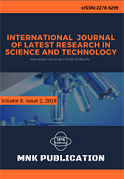DOI:10.29111/ijlrst ISRA Impact Factor:3.35, Peer-reviewed, Open-access Journal
Open Access
International Journal of Latest Research in Science and Technology Vol.10 Issue 2, pp 37-41,Year 2021
Received : 27 August 2021; Accepted : 10 September 2021 ; Published : 30 September 2021

| Download | 128 |
|---|---|
| View | 185 |
| Article No. | 11025 |
The third wave of the pandemic due to COVID-19 promotes fear on a social level, but also on an individual level exacerbates anxiety and symptoms that look like depression and seems to lead to other mental issues (eg mood problems, sleep problems, phobia-like behaviors, panic-like symptoms). While most of us at this time may experience anxiety and "heavy" mood due to incarceration, in a significant portion of the world the condition has triggered serious psychological problems, with experts worried that these growing disorders will continue to exist and after the end of the pandemic. Research shows that machine learning techniques help significantly in tool development by helping physicians anticipate mental disorders and support patient care. Early detection and treatment can help any patient in the early stages of any disease. In this work we carried out stress and depression prediction using seven Machine Learning algorithms achieving 100% correct prediction with Multilayer Perceptron classifier.
Copyright © 2021 Georgia Konstantopoulou et al. This is an open access article distributed under the Creative Commons Attribution 4.0 International (CC BY 4.0) license which permits unrestricted use, distribution, and reproduction in any medium, provided the original work is properly cited.
Georgia Konstantopoulou, Theodoros Iliou, Katerina Karaivazoglou, Konstantinos Assimakopoulos, Panagiotis Alexopoulos and George Anastassopoulos , " Machine Learning Methods For The Psychological Distress (or Depressive And Anxiety Symptoms) Of The Greek General Population During The Covid19 Lockdown ", International Journal of Latest Research in Science and Technology . Vol. 10, Issue 2, pp 37-41 , 2021

MNK Publication was founded in 2012 to upholder revolutionary ideas that would advance the research and practice of business and management. Today, we comply with to advance fresh thinking in latest scientific fields where we think we can make a real difference and growth now also including medical and social care, education,management and engineering.

We offers several opportunities for partnership and tie-up with individual, corporate and organizational level. We are working on the open access platform. Editors, authors, readers, librarians and conference organizer can work together. We are giving open opportunities to all. Our team is always willing to work and collaborate to promote open access publication.

Our Journals provide one of the strongest International open access platform for research communities. Our conference proceeding services provide conference organizers a privileged platform for publishing extended conference papers as journal publications. It is deliberated to disseminate scientific research and to establish long term International collaborations and partnerships with academic communities and conference organizers.